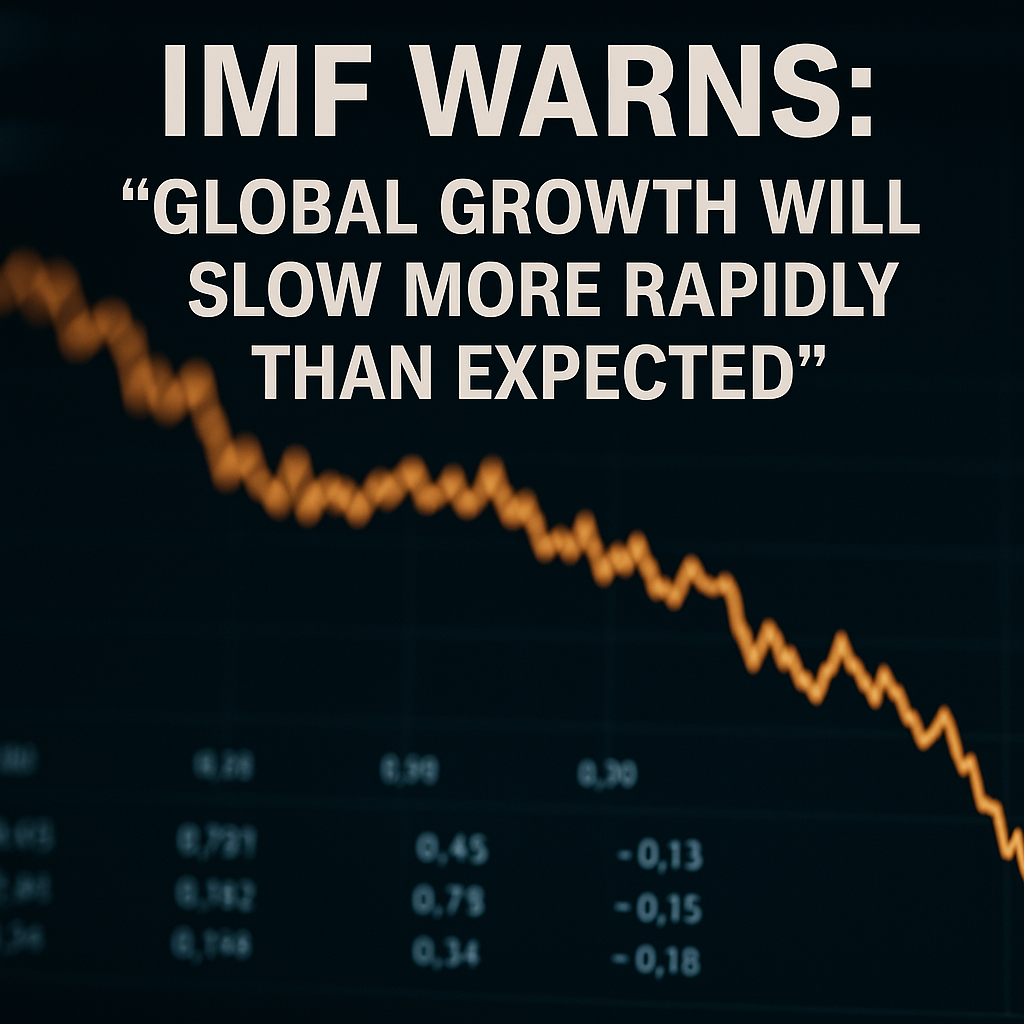
In a sobering assessment of the global economy, the International Monetary Fund (IMF) has issued a warning that global growth will decelerate more rapidly than previously anticipated. This updated forecast, published in the IMF’s latest World Economic Outlook, highlights growing concerns about the potential risks facing the world economy. While economic recovery was initially projected to continue its momentum after the pandemic, the IMF now foresees a more challenging path ahead.
Factors Contributing to Slower Global Growth
The IMF’s updated forecast reflects a number of interrelated factors that are contributing to the slowdown in global economic activity. These include rising inflationary pressures, supply chain disruptions, and the potential for further tightening of monetary policy by central banks around the world. Here are the key drivers of this projected deceleration:
- Persistent Inflation: Inflation has become a significant concern globally, especially as the world continues to grapple with the aftermath of the COVID-19 pandemic. Disruptions to supply chains, as well as rising energy costs, have led to higher prices for goods and services. While some governments have attempted to curb inflation through monetary and fiscal policies, the IMF warns that the situation is unlikely to improve in the short term. Inflationary pressures could continue to strain consumer spending, dampening overall economic growth.
- Supply Chain Bottlenecks: The pandemic triggered widespread disruptions in global supply chains, and while some industries have recovered, others are still struggling with bottlenecks. Supply chain issues, combined with labor shortages in certain sectors, are exacerbating inflation and preventing businesses from meeting demand. The IMF notes that this supply chain fragility could persist, particularly in regions reliant on manufacturing and exports.
- Rising Interest Rates: In an effort to combat rising inflation, many central banks, including the U.S. Federal Reserve and the European Central Bank, have signaled their intent to increase interest rates. While these measures are intended to cool down overheating economies, higher borrowing costs may also have a detrimental effect on investment and consumer spending. For emerging markets, the IMF warns that higher interest rates could lead to capital outflows and currency depreciations, further hampering growth prospects.
- Geopolitical Tensions and Trade Disruptions: Geopolitical risks, including tensions between major global powers, have added an additional layer of uncertainty to the global economy. Trade disruptions and trade wars could lead to further supply chain challenges and deter investment. The IMF highlights the importance of global cooperation to maintain open trade channels and reduce protectionist policies that could hinder economic recovery.
- Uncertainties Around the Pandemic and Future Health Crises: While the worst of the pandemic may have passed, the IMF cautions that there are still lingering risks associated with future health crises. The potential for new variants of the COVID-19 virus or other public health emergencies could disrupt economic activity once again, especially if lockdowns or restrictions are re-imposed. Moreover, the healthcare sector’s ability to manage future outbreaks will play a crucial role in shaping economic recovery.
- Environmental and Climate Change Risks: The impact of climate change is becoming increasingly apparent, with extreme weather events, such as floods, wildfires, and hurricanes, disrupting economic activity in vulnerable regions. The IMF has stressed the importance of addressing environmental sustainability in economic planning to avoid long-term damage to global growth prospects.
Regional Growth Outlook
While the IMF’s global growth forecast has been revised downward, the impact varies across different regions. Advanced economies, including the United States and the European Union, are expected to face slower growth due to tighter monetary policies and persistent inflation. However, the IMF notes that these economies are better positioned to weather these challenges, thanks to relatively stable financial systems and stronger vaccination rates.
Emerging markets, particularly those in Asia and Latin America, are expected to experience more significant slowdowns. These regions face a combination of factors such as rising debt levels, currency volatility, and weaker domestic demand. Additionally, the IMF warned that supply chain disruptions and inflationary pressures could weigh heavily on growth prospects for emerging economies, leading to a broader disparity in economic recovery.
Africa, too, is anticipated to face slower growth, particularly in regions dependent on commodity exports, which are vulnerable to fluctuations in global demand. The IMF highlights the need for stronger governance and economic diversification to ensure that African countries are more resilient to future shocks.
IMF’s Policy Recommendations
To address these challenges, the IMF has called for a coordinated policy response from governments and central banks. The organization emphasizes the need for a balanced approach, combining fiscal stimulus measures with policies aimed at addressing long-term structural challenges, such as climate change, income inequality, and labor market disruptions.
In addition, the IMF stresses the importance of global cooperation in tackling issues such as trade barriers, vaccine distribution, and climate change. Multilateral organizations and international financial institutions must work together to ensure a stable and inclusive global recovery.
The Path Forward: Managing Risks and Fostering Resilience
The IMF’s warning highlights the need for careful monitoring and responsive policy adjustments in the coming years. Governments will need to remain flexible and adapt to rapidly changing conditions. For businesses and investors, navigating this uncertain economic landscape will require agility and a focus on long-term strategies.
Key measures include investing in infrastructure, technology, and innovation to boost productivity, as well as ensuring a strong social safety net to support the most vulnerable populations. Additionally, fostering greater economic diversification and building resilience against future shocks will be critical to ensuring sustainable growth in the years ahead.
Conclusion: A Challenging Road Ahead
In conclusion, the IMF’s warning about the global economy underscores the challenges facing the world as it navigates the aftermath of the pandemic. With inflationary pressures, supply chain disruptions, and rising interest rates, the path to recovery will likely be slower and more uneven than initially expected. However, through coordinated action, resilience-building efforts, and targeted policy responses, there is still hope that global growth can be restored in the longer term. As economies adjust to these new realities, they must remain flexible and proactive in addressing emerging risks to ensure a more sustainable and inclusive future.




